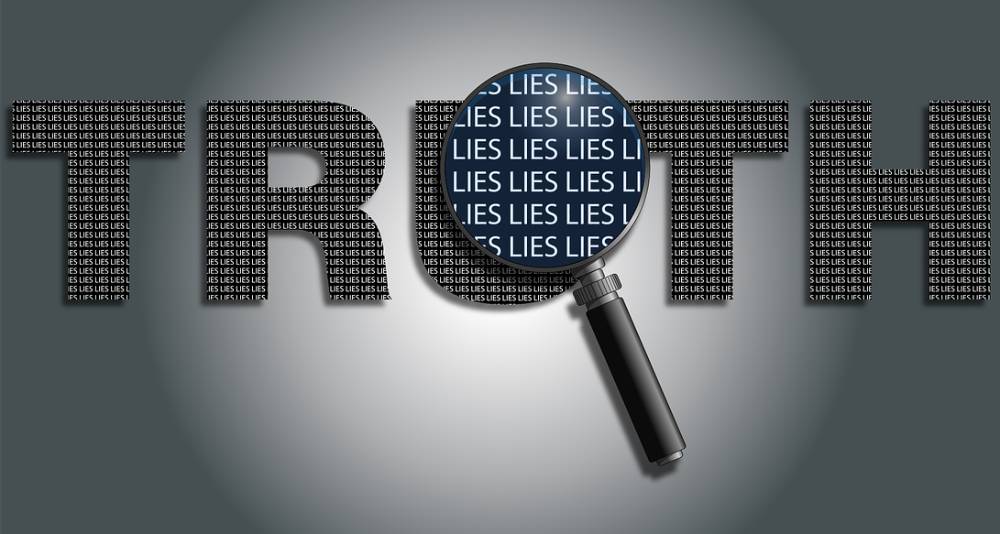The windowpane rattled as Pastor Dani’s voice rose above the congregation. I squirmed in my seat, feeling as if his words were directed specifically at me. “The truth shall make you free,” he thundered, pointing to the words inscribed on the wall behind him.
My mind flashed to the little white lies I’d told that week. The exaggeration to my boss about why I was late. The fake excuse to get out of a family dinner. Small things, really.
But as the pastor continued exploring John 8:32, something struck me deeply. Was I truly free? Or was I entangled in a web of small deceptions that had become so normal I hardly noticed them anymore?
That sermon changed something in me. It dawned on me that truth, even when it’s hard, leads to real freedom. Not just spiritual freedom, but emotional and relational freedom as well.
Jesus wasn’t offering a nice platitude when he said,
“You shall know the truth, and the truth shall make you free.”
He shared a deep spiritual principle which touches every part of our lives.
Key Takeaways:
- Truth is foundational to God’s character.
- Hypocrisy creates barriers between us and God.
- Lying leads to spiritual bondage, while honesty leads to freedom.
- Confession and transparency are essential spiritual disciplines.
- Living truthfully strengthens our witness to others.
The Problem of Hypocrisy: When Our Lives Don’t Match Our Words

Jesus reserved His harshest words for the religious leaders. He didn’t focus on their theological mistakes; He pointed out their hypocrisy. Their actions didn’t match their teachings.
In Matthew 23:27 (NIV), Jesus delivers a blistering critique:
“Woe to you, teachers of the law and Pharisees, you hypocrites! You are like whitewashed tombs, which look beautiful on the outside but on the inside are full of the bones of the dead and everything unclean.”
These religious leaders spoke well and looked perfect on the outside. But their hearts were far from God.
This same issue plagues many of us today. We can say all the right “Christian” phrases and look great on Sunday mornings. But inside, we could be hiding dishonesty, bitterness, or secret sin.
This gap between how we show ourselves and who we really are builds a wall. This stops us from having true relationships with God and others.
Hypocrisy is especially damaging because:
- It repels nonbelievers who can sense inauthenticity.
- It hinders spiritual growth.
- It blocks God’s mercy and grace.
- It damages our ability to know God intimately.
Having a close relationship with God requires honesty and transparency.
Truth as a Core Value of God’s Nature

Truth is important because it reflects God’s nature. It’s not just an idea; it’s central to who God is. Scripture tells us that “God is light and in Him there is no darkness at all” (1 John 1:5). Jesus identified Himself as “the way, the truth, and the life” (John 14:6). The Holy Spirit is repeatedly called the “Spirit of truth” (John 16:13).
When we embrace truth, we align ourselves with God’s very nature. When we practice deception—even in small ways—we move into opposition to His character. This is why walking with God requires walking in truth.
In the Gospel of John, Jesus makes this connection explicit when talking to the Jews who believed in Him:
“31 If ye continue in my word, then are ye my disciples indeed; 32 And ye shall know the truth, and the truth shall make you free.” – John 8:31-32, KJV
Jesus connects discipleship directly to knowing and living the truth. Truth in this context isn’t just factual accuracy. It’s a way of life characterized by sincerity, authenticity and transparency.
It means we do not present ourselves as something we are not. We do not hide our failures behind religious language. We open ourselves completely to God.
The Bondage of Deception: How Lies Enslave Us

If truth brings freedom, what happens when we embrace deception? Jesus provides a stark answer when addressing the religious leaders of the day:
“You are of your father the devil, and your will is to do your father’s desires. He was a murderer from the beginning, and does not stand in the truth, because there is no truth in him. When he lies, he speaks out of his own character, for he is a liar and the father of lies” – John 8:44 (ESV)
Deception is the devil’s native language. When we lie, we align ourselves with his influence rather than God’s. This creates spiritual bondage that manifests in various ways:
- Guilt and shame drive us further from God.
- We’re under the constant stress of maintaining false narratives.
- Damaged relationships due to misrepresentations.
- Spiritual stagnation occurs as we cannot grow from issues we will not acknowledge.
- Internal dissonance between who we are and who we pretend to be.
The world normalizes small deceptions. We call them “white lies” or “bending the truth.” We say we’re “fine” when we’re struggling. We present curated versions of ourselves on social media. We exaggerate stories to make ourselves look better.
These may seem small, but they add up to form a pattern of dishonesty that becomes entrenched.
Proverbs 28:13 (ESV) addresses this directly:
“Whoever conceals his transgressions will not prosper, but he who confesses and forsakes them will obtain mercy.”
Keeping things hidden results in spiritual poverty, but honesty brings mercy and freedom.
The Path to Freedom Through Truth

So how do we break free from the bondage of deception? The path begins with radical honesty. First with ourselves, then with God, and finally with others.
1 John 1:9 (ESV) offers this life-changing promise:
“If we confess our sins, he is faithful and just to forgive us our sins and to cleanse us from all unrighteousness.”
This verse doesn’t ask us to only acknowledge our transgressions. It urges us to call sin sin and bring it into the light by confessing and turning away from it.
Jesus demonstrated this principle in John 8 with the woman caught in adultery. When everyone else was ready to condemn her, Jesus showed her mercy. But He didn’t pretend her sin wasn’t sin. He told her,
“Go, and from now on sin no more.” – John 8:11 (ESV)
True freedom doesn’t come from ignoring our failures. It comes from facing them and accepting God’s grace to help us change.
This process isn’t always comfortable. It doesn’t mean you’ll always do everything perfectly. It doesn’t mean you won’t make mistakes.
Truth requires vulnerability, but that vulnerability opens the door to true transformation.
Practical Steps Toward Living in Truth

Living truthfully sounds simple, but it takes practice. This is true in a world where deception is common. Here are practical steps to develop truth in your life:
1. Develop Self-Awareness
Pay attention to when and why you might feel tempted to bend the truth. Is it to avoid conflict? To make yourself look better? To escape consequences? Understanding your patterns is the first step to changing them.
2. Practice Thoughtful Speech
You don’t have to share every thought or feeling, but what you do choose to express should be honest. What you choose to say should be as accurate and as honest as you know.
3. Prioritize Truth Even When It Costs You
Sometimes honesty comes with a price. It might cost you a relationship, a job opportunity, or someone’s good opinion. As believers, we should value truth more than these temporary losses. God honors and rewards integrity.
4. Worship in Spirit and Truth
Jesus told the Samaritan woman that true worshipers worship “in spirit and truth” (John 4:23). Our relationship with God must be based on honesty, not religious performance. Share your real struggles, doubts, and failures with Him. Don’t hide behind a polished religious facade.
5. Study Scripture Daily
Regular engagement with God’s word helps align our thinking with truth. Read one or two chapters every day, then take the time to reflect on what you’ve read.
The Power of a Truthful Witness

One of the most common criticisms nonbelievers level against Christians is hypocrisy. They see people who say they follow Christ, but their lives don’t show it. This disconnect causes significant harm to our witness.
When believers show integrity, it makes a strong statement. We should admit mistakes, speak honestly, and live authentically. People may disagree with our beliefs, but they will respect consistency and honesty.
In a world filled with propaganda and deception, truth will stand out. When we commit to truth in every area of our lives, we reflect the character of Christ to those around us. As Jesus said in Matthew 5:16 (ESV),
“Let your light shine before others, so that they may see your good works and give glory to your Father who is in heaven.”
This doesn’t mean being tactless or unnecessarily blunt. Truth can be spoken with grace and compassion. But it does mean abandoning pretense and embracing authenticity in all our interactions.
Conclusion: Embracing the Freedom of Truth
The promise Jesus gives in John 8:32—“you shall know the truth, and the truth shall make you free”—isn’t only about spiritual understanding. It’s also about embracing a lifestyle of honesty that aligns with God’s character.
This freedom isn’t automatic. It takes courage to look at ourselves honestly. We need humility to admit our failures. Also, we must have faith that God’s mercy is there for us when we confess. But the freedom that results is worth every moment of discomfort.
I invite you today to consider areas where you might be living in deception. Ask the Holy Spirit to show you where you haven’t been honest. This could be with yourself, with God, or with others. Then take the brave step of bringing those areas into the light.
As you do, you’ll discover the liberating power of truth. The mask will fall away. The burden of maintaining false narratives will lift. And you’ll experience the freedom that comes from living authentically.
“You shall know the truth, and the truth shall make you free.”
Not just partially free or temporarily free, but profoundly and permanently free. That’s the promise of Christ, and it’s available to everyone who embraces a life of truth.
Frequently Asked Questions
Q. What does “the truth shall make you free” mean in the Bible?
A. This phrase comes from John 8:32, where Jesus says, “And ye shall know the truth, and the truth shall make you free.” In context, Jesus is speaking about how His teachings (the truth) will liberate people from the bondage of sin and deception. It refers not just to factual accuracy but to the life-transforming power of God’s truth.
Q. How does truth make us free according to the Bible?
A. Truth makes us free by:
1. Exposing deception that keeps us in bondage.
2. Allowing us to receive God’s mercy through honest confession.
3. Enabling authentic relationships with God and others.
4. Aligning us with God’s character rather than the devil’s deception.
Q. Why did Jesus speak so harshly against hypocrisy?
A. Jesus condemned hypocrisy because it directly opposes God’s nature. Hypocrisy hurts our bond with God. It ruins our witness to others and stops us from feeling the freedom Christ gives. Jesus wants us to have a real relationship with God, not just to perform religious tasks.
Q. How can I practice more honesty in my daily life?
A. Start by examining your speech patterns and asking whether you’re being completely honest in your interactions. Call sin sin and do not water it down. When you make mistakes, admit them promptly. Choose to speak truth even when it’s uncomfortable. And regularly ask God to reveal areas of deception in your life.
Q. Is it ever okay to not tell the truth?
A. The Bible consistently upholds honesty as a virtue. But it doesn’t require that we share every thought or detail. Wisdom, discretion, and kindness should guide our speech. However, direct deception is not endorsed in Scripture. We decide what and how much to share. This way, we keep our integrity in what we communicate.






